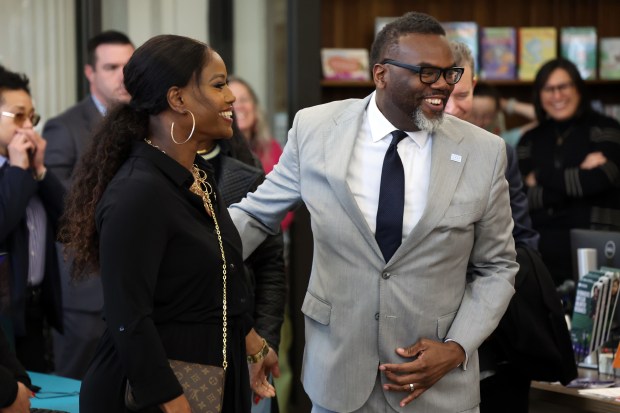The Illinois House has delivered a remarkable rebuke to the Chicago Teachers Union.
On Thursday, the House voted 92-8 for Rep. Margaret Croke’s bill that essentially would forestall any major changes to the city’s selective-enrollment schools until there’s a fully elected school board in Chicago. That won’t happen until 2027, the year — coincidentally or not — that Mayor Brandon Johnson will be up for reelection. Senate passage appears likely, and Gov. J.B. Pritzker last week also pledged his support.
The vote came over the protests not just of the CTU but the Chicago Board of Education. Board Vice President Elizabeth Todd-Breland said Wednesday that the measure was trying to solve “a problem that does not actually exist.”
She was referring to the potential closure or defunding of selective-enrollment schools.
Of course, that isn’t the real problem the bill is addressing, and Todd-Breland and School Board President Jianan Shi, who has said similar things, presumably know that. Croke and Pritzker are too politic to say so, but this bill is a vote of no confidence in Johnson, CTU President Stacy Davis Gates and the Board of Education, which is dominated by Johnson appointees and will remain under their control following the election of slightly less than half the board in November.
The school board scared the daylights out of parents of Chicago school-age children late last year when it called for a rethinking of Chicago Public Schools’ selective-enrollment options. This page raised alarm bells at the time. There are three dozen such schools, many of them highly regarded and even nationally recognized, and they play a crucial role in giving many families of school-age children reason to raise their kids in the city when otherwise they’d feel compelled to move to the suburbs just for the schools.
Since then, the board has scrambled to insist to the public that it’s not going to close any of these schools nor will it reduce their funding — at least the majority of them. In the same breath, CPS leaders speak of substantial changes to the admissions process with the goal of providing more access to those schools for low-income and minority students. While a laudable goal in concept, details on those changes are essentially nil.
Adding to the skepticism of suspicious parents, the board has dramatically overhauled annual budgeting for CPS schools. Broadly speaking, the board is doing away with the past method, which allocated a substantial chunk of each school’s annual funding based on the number of students attending the school, and instead is striving to make struggling neighborhood schools more attractive options for families by beefing up their staffing and programming. Helping fuel the worries, the board won’t yet make public its budgets for each school. With very little meat on the bones, Springfield isn’t waiting for the CPS budget to emerge this coming summer, by which time the legislative session will be over, to act. Conveniently for Croke and Pritzker, CTU and the mayor played into critics’ hands by insisting earlier this year on electing a minority of Chicago school board members in November rather than a full slate, as Senate President Don Harmon suggested last year.
CTU in years past called for electing all board members. But that was when Lori Lightfoot, the union’s foe, was mayor. Once the union got their own lobbyist, Brandon Johnson, elected, Davis Gates and company decided it was fine to keep the board under their ally’s control. The rationale was as plain as it was cynical. Why bother electing a full board when the union already has such a good pal on the fifth floor?
But the short-term thinking has backfired. Croke and Pritzker both are justifying their position that major school changes — like a complete overhaul of the selective-enrollment process in Chicago — should wait for a fully elected school board. After all, that’s the democratic thing to do — and the reasoning is difficult to argue against. It also means the 92 lawmakers who voted for the bill don’t have to say openly they don’t trust Johnson and Davis Gates on this issue.
Davis Gates, using her typically divisive language, labeled Croke’s bill “racist.” Springfield lawmakers, naturally, took offense.
It didn’t help Davis Gates’ cause, either, that her fruitless efforts in Springfield coincided with her demand for 9% annual raises in the upcoming contract. There was some initial confusion last week as to whether the 9% figure was a ceiling or a floor, since the union wants to protect its members from inflation by ensuring pay keeps pace with the consumer price index. Sure enough, it’s a floor. Those pay raises would go even higher if the CPI somehow exceeds 9%. (God help us all if that’s the case.) That will curry a lot of favor with taxpayers.
Davis Gates’ last bit of questionable strategizing is her proposal that negotiations with the city be held in public. Apparently, she thinks that will galvanize public support for, say, 9% raises.
If the goal is to get a contract completed and have schools open on time in the fall, a public negotiation is a terrible idea, likely to produce a lot of grandstanding and speechifying. Those with experience in any high-stakes negotiation can tell you that representatives of opposing sides need to be able to speak freely with each other. Only then can deals be struck.
Johnson could go a small way toward reassuring Chicagoans worried about his coziness with Davis Gates by saying no to that performative idea.
In the meantime, Johnson and Davis Gates ought to take stock of that 92-8 vote of no confidence. When Springfield feels compelled to halt your education agenda in its tracks, you should reflect on how better to persuade people outside your progressive echo chamber of the wisdom of your ideas.
Submit a letter, of no more than 400 words, to the editor here or email letters@chicagotribune.com.



